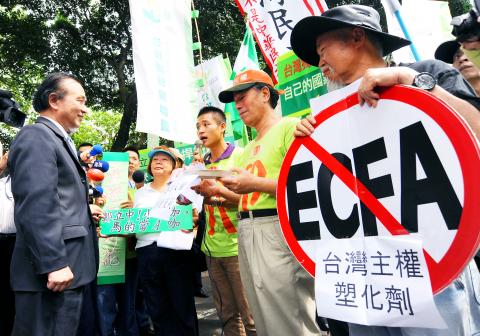About 30 protesters armed with signs and slogans were cordoned off by plainclothes police outside the Grand Hotel in Taipei yesterday where a meeting between cross-strait negotiators was being held.
The gathering, led by the Alliance of Referendum for Taiwan, was part of ongoing protests the group has planned against all types of cross-strait meetings, with the protest’s leaders saying interactions have eroded Taiwanese sovereignty.
“Taiwan and China, each side is a different country,” chanted members of the group, most of whom were middle-aged or elderly, before several of them ripped up paper emblems of the Republic of China and People’s Republic of China combined on one flag.

Photo: Lo Pei-der, Taipei Times
The protesters were held back by a dozen plainclothes officers who cordoned the group into a small area outside the main gate of the hotel.
Prevented from entering the hotel, the protest’s leaders decided to hand a Straits Exchange Foundation official on the scene a pot filled with dried jasmine flowers and a bottle containing di(2-ethylhexyl) phthalate, or DEHP, the chemical at the center of the recent food scare in Taiwan.
The two items were chosen because they were representative of cross-strait relations, said Chang Ming-yu (張銘祐), an executive director of the alliance.
“The flowers represent Taiwan’s democracy and freedoms that are being taken away by closer interactions between Taiwan and China,” Chang said. “Meanwhile, DEHP products have been found only in Taiwan and not China — despite being made by the same company in one instance.”
It shows the cross-strait inequality and how in some cases inferior products are left in Taiwan while better products are exported across the Taiwan Strait, he said.
“We will continue to monitor and protest cross-strait discussions,” he said, echoing promises by other pro-independence group leaders to rally against cross-strait meetings, regardless of whether they are of business nature or other.
Earlier the alliance, the Northern Taiwan Society and other groups gathered at the legislature where, supported by a Democratic Progressive Party lawmaker, said cross-strait pacts have failed to make life better for most Taiwanese.

Taiwanese can file complaints with the Tourism Administration to report travel agencies if their activities caused termination of a person’s citizenship, Mainland Affairs Council Minister Chiu Chui-cheng (邱垂正) said yesterday, after a podcaster highlighted a case in which a person’s citizenship was canceled for receiving a single-use Chinese passport to enter Russia. The council is aware of incidents in which people who signed up through Chinese travel agencies for tours of Russia were told they could obtain Russian visas and fast-track border clearance, Chiu told reporters on the sidelines of an event in Taipei. However, the travel agencies actually applied

Japanese footwear brand Onitsuka Tiger today issued a public apology and said it has suspended an employee amid allegations that the staff member discriminated against a Vietnamese customer at its Taipei 101 store. Posting on the social media platform Threads yesterday, a user said that an employee at the store said that “those shoes are very expensive” when her friend, who is a migrant worker from Vietnam, asked for assistance. The employee then ignored her until she asked again, to which she replied: "We don't have a size 37." The post had amassed nearly 26,000 likes and 916 comments as of this

New measures aimed at making Taiwan more attractive to foreign professionals came into effect this month, the National Development Council said yesterday. Among the changes, international students at Taiwanese universities would be able to work in Taiwan without a work permit in the two years after they graduate, explainer materials provided by the council said. In addition, foreign nationals who graduated from one of the world’s top 200 universities within the past five years can also apply for a two-year open work permit. Previously, those graduates would have needed to apply for a work permit using point-based criteria or have a Taiwanese company

US President Donald Trump said "it’s up to" Chinese President Xi Jinping (習近平) what China does on Taiwan, but that he would be "very unhappy" with a change in the "status quo," the New York Times said in an interview published yesterday. Xi "considers it to be a part of China, and that’s up to him what he’s going to be doing," Trump told the newspaper on Wednesday. "But I’ve expressed to him that I would be very unhappy if he did that, and I don’t think he’ll do that," he added. "I hope he doesn’t do that." Trump made the comments in